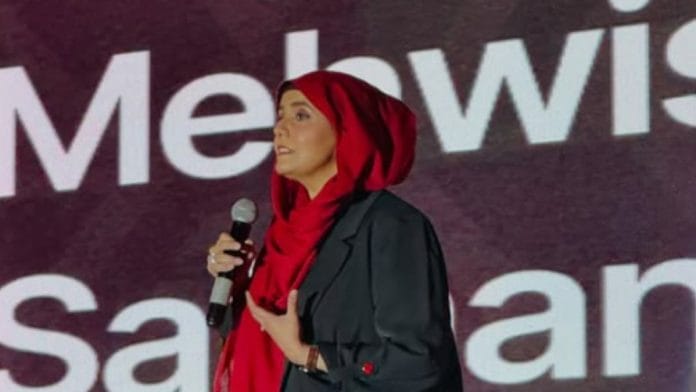New Delhi: Pakistan’s bold leap into the world of AI is being led by a woman. Zahanat AI, the nation’s first homegrown AI platform, developed by entrepreneur Mehwish Salman Ali, promises to address Pakistan’s unique challenges with culturally sensitive and locally relevant solutions.
For Ali, this is personal.
“Zahanat isn’t just a tech product—it’s a challenge to the status quo. It’s proof that Pakistan can build, lead, and own its future,” she told ThePrint.
Launched by Data Vault, a Pakistani tech firm, Zahanat AI marks a significant step in Pakistan’s AI development. It is a text-based model designed to engage in human-like conversations, answer questions, and assist across various fields.
For years, Ali watched as Pakistan relied on imported technologies that often failed to understand the country’s language, culture, and context. These AI models were powerful, but they weren’t built for Pakistan.
“Why not Pakistan? Why can’t we build our own intelligence? Something that actually speaks to who we are?” Ali recalled asking herself.
The question, born from frustration and determination, became the seed for Zahanat AI.
“It’s not just about features. It’s about representation. It’s about showing that we can build world-class technology from here—not by imitation, but by innovation,” she added.
According to Ali, the idea for Zahanat AI emerged from necessity rather than convenience. What sets it apart from other GPT platforms is that it was built with Pakistan in mind. It doesn’t just translate; it understands the culture behind the words.
The journey was far from easy. The biggest hurdle was accessing high-performance computing resources in Pakistan, infrastructure that is hard to come by in a country where such support is scarce. But Ali was undeterred.
“People told me it couldn’t be done here. That we didn’t have the talent, the tools, or the environment. But I believed otherwise,” she said.
Also read: Hania Aamir is basking in her UK award glory. Pakistanis say she has zero talent
Breaking barriers
Zahanat’s journey began as a private initiative, driven entirely by Ali’s vision and determination. “I didn’t wait for funding or approval. I just knew this had to happen,” she said.
But while the project began independently, Ali always saw the value in collaboration. Over time, government institutions, academia, and private sector players showed interest in Zahanat’s potential. They could see the benefits from an indigenous AI model rooted in the needs of Pakistan’s people.
The response to Zahanat has been overwhelmingly positive.
“People are excited because this is ours. This is Pakistan’s AI, created by Pakistanis for Pakistanis. I want Zahanat to show every young coder and dreamer in Pakistan that we’re not just part of the AI conversation—we can lead it,” Ali said.
The platform is designed to empower Pakistani citizens, particularly in sectors like education and healthcare. One of Zahanat’s most anticipated developments is the upcoming Z2 model, which will support Urdu and multiple regional languages. This is a game-changer for more than half of Pakistan’s population, a large part of which struggles with English or even Urdu.
Ali imagines the platform being used by a rural student to access world-class education in their native Sindhi or Pashto. She dreams of Zahanat helping an elderly woman receive her healthcare diagnosis in Balochi.
“We’re not just enabling access to AI, we’re redefining who gets to be part of the ecosystem. We’re moving from a digital divide to digital empowerment. This isn’t just tech progress. It’s social progress,” Ali said.
Zahanat is a personal mission for Ali to break the gender barriers that persist in tech. She has faced bias in the male-dominated industry, both spoken and unspoken.
“When I lead a project like Zahanat, it’s not just innovation, it’s disruption. It’s proof that women can lead tech.”
(Edited by Prasanna Bachchhav)






